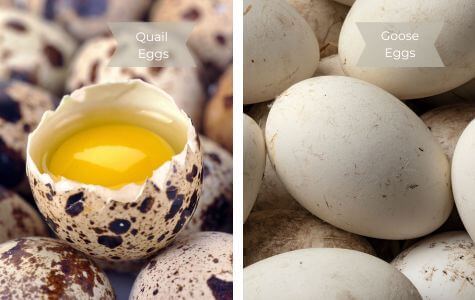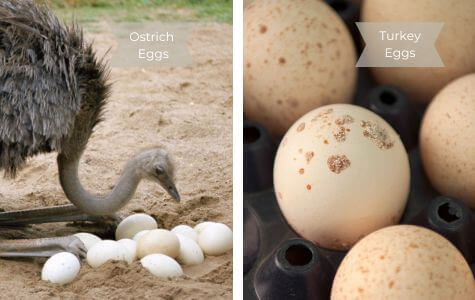Two ways to categorize eggs: How the hens were raised and by the bird that laid them.

Chicken Eggs – They are the most common type of egg found in grocery stores. From small to jumbo, they come in a variety of sizes, and can be white or brown. The shell color has no affect on the taste or nutritional value of the egg.
Duck Eggs – Duck eggs are larger than chicken eggs with a richer flavor. They are often used in baking and in Asian cuisines.

Quail Eggs – They are about the size of a marble, tiny, tiny eggs. Quail Eggs are delicate and have a distinct flavor and are often served as appetizers or used in salads and sushi.
Goose Eggs – Larger than chicken eggs, goose eggs have a rich, creamy flavor. They are less commonly consumed compared to other types of eggs but are sometimes used in baking or cooking.

Ostrich Eggs – Ostrich eggs, largest of all bird eggs, can weigh up to 3-6 pounds. They have a creamy taste with a thick shell. Ostrich eggs are commonly used for novelty purposes or in large-scale cooking.
Turkey Eggs – Similar in size to chicken eggs, turkey eggs have a slightly different flavor. They are not as common as chicken eggs.
How was the Hen Raised
Conventional Eggs – Most common type of egg. Hens are often raised in cages with limited space.
Cage-Free Eggs – Hens are not kept in cages, but may not have access to the outdoors.
Free-Range Eggs – Hens have access to the outdoors, but may not have much space to roam.
Pasture-Raised Eggs – Hens are raised on pasture, where they eat grass, bugs, and other natural foods.
Organic Eggs – Hens are fed organic feed with access to the outdoors.
In addition, there are a few other types of eggs you may find in grocery stores, such as:
Omega-3 Enriched Eggs – Laid by hens that are fed a diet that is high in omega-3 fatty acids.
Brown Eggs vs. White Eggs – Unfortunately, there is a misconception that brown eggs are healthier or more nutritious than white eggs. The color of the egg shell has nothing to do with nutritional value. What determines the shell color? The breed of chicken that lays the egg.
These are some of the common types of eggs, but there are many other variations depending on the species and their culinary uses.


